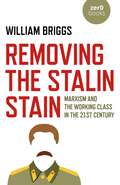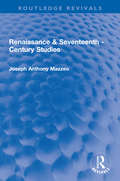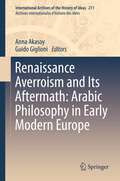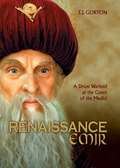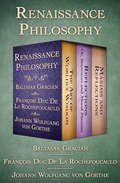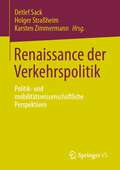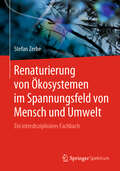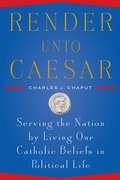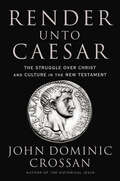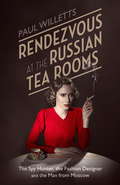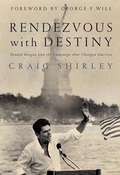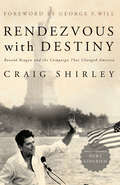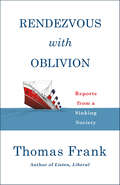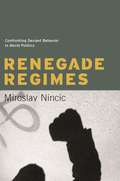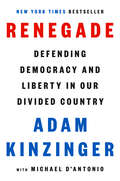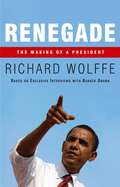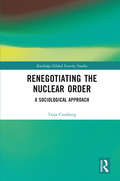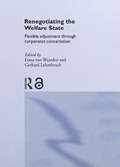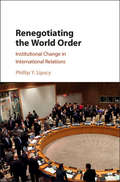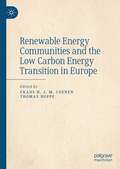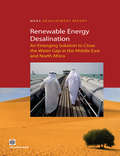- Table View
- List View
Removing the Stalin Stain: Marxism and the Working Class in the 21st Century
by William Briggs'Briggs tackles head-on the zone of conflict that Marx never quite got to, though not for lack of ambition. How do nation-states both manage and contest the military-industrial surges of global capitalism? Arguing the novel thesis that Stalin did good work for capitalism, offering its defenders an open goal to score against Marxism, Removing the Stalin Stain presents a clearly argued and outward-facing Marxist analysis of contemporary politics.' Terrell Carver, Professor of Political Theory, University of Bristol, UKCan Marxism emerge from the long shadow cast by Stalinism, and challenge capitalism? There is undoubtedly a growing interest in Marxism and socialism. Opinion polls show a majority that regard socialism as a real option. It is against this reality, and as a contribution to growing debates, that this book has been written. Marxism, as an ideological force and instituted to lead the charge against capitalism, has been poorly served in the past century. Many of its core messages have been obscured. William Briggs gives a rousing defence of Marxism, calling for a return of the working class to the centre of potential struggle. Briggs seeks to heal the damage done to Marxism, in the name of Marxism, over generations past.
Renaissance & Seventeenth - Century Studies (Routledge Revivals)
by Joseph Anthony MazzeoFirst published in 1964, Renaissance & Seventeenth - Century Studies contains essays which fall into two groups. The first four are concerned with problems of metaphor and style and treat two important eras in literary history when these problems underwent critical re-examination. St. Augustine marks the classical attempt to take account of "biblical poetics" while the two essays on the theory of the "metaphysical" style treat the attempt of seventeenth century critics to comprehend, at the theoretical level, the expansion of metaphysical possibilities that marked the "metaphysical" movement. The second group of essays are, in general, concerned with Machiavelli and Machiavellism and Andrew Marvell. However, they are again essentially concerned with the way in which crucial metaphors and idea-images serve as principles for organising experience both in Machiavelli’s own writings and in that of work of Marvell which reflects his influence. The final essay "Cromwell as Davidic King", weaves together Machiavellian and Augustinian strands as they are manifested in the works of a poet of wit, the "various light" of whose mind responded harmoniously to the different currents of thought and taste these essays discuss. This book will be an essential read for scholars and researchers of literature, literary history, political philosophy, and philosophy in general.
Renaissance Averroism and Its Aftermath: Arabic Philosophy in Early Modern Europe
by Guido Giglioni Anna AkasoyWhile the transmission of Greek philosophy and science via the Muslim world to western Europe in the Middle Ages has been closely scrutinized, the fate of the Arabic philosophical and scientific legacy in later centuries has received less attention, a fault this volume aims to correct. The authors in this collection discuss in particular the radical ideas associated with Averroism that are attributed to the Aristotle commentator Ibn Rushd (1126-1198) and challenge key doctrines of the Abrahamic religions. This volume examines what happened to Averroes's philosophy during the sixteenth, seventeenth and eighteenth centuries. Did early modern thinkers really no longer pay any attention to the Commentator? Were there undercurrents of Averroism after the sixteenth century? How did Western authors in this period contextualise Averroes and Arabic philosophy within their own cultural heritage? How different was the Averroes they created as a philosopher in a European tradition from Ibn Rushd, the theologian, jurist and philosopher of the Islamic tradition?
Renaissance Emir: A Druze Warlord at the Court of the Medici
by T. J. GortonThis groundbreaking biography of Fakhr ad-Din, Prince of the Druze, is based on the author's vivid new translations of contemporary sources in Arabic and other languages. It brings to life one remarkable man's beliefs and ambitions, uniquely illuminating the elusive interface between Eastern and Western culture.
Renaissance Philosophy: The Art of Worldly Wisdom; Reflections: Or, Sentences and Moral Maxims; and Maxims and Reflections
by Baltasar Gracián Johann Wolfgang von Goethe François Duc De La RochefoucauldWisdom for today&’s world from three great thinkers of the Renaissance era. This collection of three philosophical works by Renaissance men offers timeless advice on how to prosper and live morally in business, romance, religion, and society. Although written in the Renaissance era, these guides still resonate today and are collected here for easy reference. In The Art of Worldly Wisdom, Baltasar Gracián advises people of all walks of life how to approach political, professional, and personal situations in a dog-eat-dog world. Comprised of three hundred pithy aphorisms, this influential work of philosophy offers thought-provoking and accessible advice. Some subjects include &“Never Compete,&” &“The Art of Letting Things Alone,&” and &“Anticipate Injuries and Turn Them into Favours.&” Reflections; or Sentences and Moral Maxims by François de La Rochefoucauld offers hundreds of brief, brutally honest observations of humankind and its self-serving nature. The perfect read for any realist—or anyone with the desire to evaluate their moral standing—this edition includes three supplements with additional maxims and essays. In Maxims and Reflections, Johann Wolfgang von Goethe takes a detour from his usual literary endeavors and offers snippets of his musings on life, literature, science, nature, politics, and the human condition. Essential for fans of Goethe&’s works, it provides unique insight into the mind of the last true Renaissance man. This ebook has been professionally proofread to ensure accuracy and readability on all devices.
Renaissance der Verkehrspolitik: Politik- und mobilitätswissenschaftliche Perspektiven
by Detlef Sack Karsten Zimmermann Holger StraßheimDer Band versammelt mobilitäts- und politikwissenschaftliche Beiträge zu verkehrspolitischen Entscheidungen und Richtungswechseln auf verschiedenen Ebenen (Bund, Land, Kommune) und zu verschiedenen Verkehrsträgern bzw. Sektoren (Schiene, Auto). Die Autoren und Autorinnen argumentieren dabei überwiegend empirisch und nutzen unterschiedliche Methoden und Ansätze. Gemeinsam sind den Beiträgen der erklärende Fokus auf mögliche Blockaden der Verkehrswende und neue Perspektiven in der Verkehrs- und Mobilitätspolitik.
Renaturierung von Ökosystemen im Spannungsfeld von Mensch und Umwelt: Ein interdisziplinäres Fachbuch
by Stefan ZerbeIn diesem disziplinübergreifenden Fachbuch, welches die Brücke zwischen den Natur- und Sozialwissenschaften schlägt, werden sowohl die wissenschaftlichen Grundlagen der Renaturierungsökologie wie auch praktische Aspekte der Ökosystemrenaturierung umfassend dargestellt. Hierbei werden die Vielfalt der Landnutzungstypen mit einem Schwerpunkt auf Mitteleuropa herausgestellt und Fallbeispiele von praktischen Renaturierungsprojekten präsentiert. Das Fachbuch bietet sowohl für Studierende, die sich mit der Umwelt beschäftigen, für Wissenschaftler wie auch für Praktiker einen profunden und aktuellen, aber auch kritischen Überblick über den Stand des Wissens. Dieses Buch erschließt das breite Spektrum degradierter Ökosysteme der mitteleuropäischen Natur- und Kulturlandschaften. In weiteren Kapiteln wird auf marine Ökosysteme und deren Renaturierung sowie auf Entwicklungspotenziale, aber auch Grenzen der Renaturierung detaillierter eingegangen. Die ökologischen Grundlagen werden durch eine interdisziplinäre Perspektive unter Berücksichtigung der Umweltethik, Soziologie, Anthropologie und Ökonomie erweitert. Das Fachbuch bietet neben einer aktuellen Übersicht über die verschiedenen Bereiche und Tätigkeitsfelder der Renaturierungsökologie und Ökosystemrenaturierung eine wertvolle Grundlage für Studium, Wissenschaft und Praxis. Die Studierenden erhalten zudem eine Hilfestellung zur Literatursuche und kritischen Faktenanalyse und die Dozenten zu Lehrformen und interdisziplinären Diskussionsansätzen der Renaturierungsökologie.
Render Unto Caesar: Serving the Nation by Living our Catholic Beliefs in Political Life
by Charles J. Chaput“People who take God seriously will not remain silent about their faith. They will often disagree about doctrine or policy, but they won’t be quiet. They can’t be. They’ll act on what they believe, sometimes at the cost of their reputations and careers. Obviously the common good demands a respect for other people with different beliefs and a willingness to compromise whenever possible. But for Catholics, the common good can never mean muting themselves in public debate on foundational issues of human dignity. Christian faith is always personal but never private. This is why any notion of tolerance that tries to reduce faith to private idiosyncrasy, or a set of opinions that we can indulge at home but need to be quiet about in public, will always fail. ” —From the Introduction Few topics in recent years have ignited as much public debate as the balance between religion and politics. Does religious thought have any place in political discourse? Do religious believers have the right to turn their values into political action? What does it truly mean to have a separation of church and state? The very heart of these important questions is here addressed by one of the leading voices on the topic, Charles J. Chaput, Archbishop of Denver. While American society has ample room for believers and nonbelievers alike, Chaput argues, our public life must be considered within the context of its Christian roots. American democracy does not ask its citizens to put aside their deeply held moral and religious beliefs for the sake of public policy. In fact, itrequiresexactly the opposite. As the nation’s founders knew very well, people are fallible. The majority of voters, as history has shown again and again, can be uninformed, misinformed, biased, or simply wrong. Thus, to survive, American democracy depends on an engaged citizenry —people of character, including religious believers, fighting for their beliefs in the public square—respectfully but vigorously, and without apology. Anything less is bad citizenship and a form of theft from the nation’s health. Or as the author suggests: Good manners are not an excuse for political cowardice. American Catholics and other persons of goodwill are part of a struggle for our nation’s future, says Charles J. Chaput. Our choices, including our political choices, matter. Catholics need to take an active, vocal, and morally consistent role in public debate. We can’t claim to personally believe in the sanctity of the human person, and then act in our public policies as if we don’t. We can’t separate our private convictions from our public actions without diminishing both. In the words of the author, “How we act works backward on our convictions, making them stronger or smothering them under a snowfall of alibis. ” Vivid, provocative, clear, and compelling,Render unto Caesaris a call to American Catholics to serve the highest ideals of their nation by first living their Catholic faith deeply, authentically.
Render Unto Caesar: The Struggle Over Christ and Culture in the New Testament
by John Dominic CrossanThe revered Bible scholar and author of The Historical Jesus explores the Christian culture wars—the debates over church and state—from a biblical perspective, exploring the earliest tensions evident in the New Testament, and offering a way forward for Christians today.Leading Bible scholar John Dominic Crossan, the author of the pioneering work The Historical Jesus, provides new insight into the Christian culture wars which began in the New Testament and persist strongly today. For decades, Americans have been divided on how Christians should relate to government and lawmakers, a dispute that has impacted every area of society and grown more rancorous over the past forty years. But as Crossan makes clear, this debate isn’t new; it can be found in the New Testament itself, most notably in the tensions between Luke-Acts and Revelations. In the texts of Luke-Acts, Rome is considered favorably. In the book of Revelations, Rome is seen as the embodiment of evil in the world. Yet there is an alternative to these two extremes, Crossan explains. The historical Jesus and Paul, the earliest Christian teachers, were both strongly opposed to Rome, yet neither demonized the Empire. Crossan sees in Jesus and Paul’s approach a model for Christians today that can be used to cut through the acrimony and polarization roiling our society and dividing us.
Rendezvous at the Russian Tea Rooms: The Spyhunter, the Fashion Designer & the Man From Moscow
by Paul WillettsRendezvous at the Russian Tea Rooms provides the first comprehensive account of what was once hailed by a leading American newspaper as the greatest spy story of World War II. This dramatic yet little-known saga, replete with telephone taps, kidnappings, and police surveillance, centres on the furtive escapades of Tyler Kent, a handsome, womanising 28-year-old Ivy League graduate, who doubles as a US Embassy code clerk and Soviet agent. Against the backdrop of London high society during the so-called Phoney War, Kent's life intersects with the lives of the book's two other memorably flamboyant protagonists. One of those is Maxwell Knight, an urbane, endearingly eccentric MI5 spyhunter. The other is Anna Wolkoff, a White Russian fashion designer and Nazi spy whose outfits are worn by the Duchess of Windsor and whose parents are friends of the British royal family. Wolkoff belongs to a fascist secret society called the Right Club, which aims to overthrow the British government. Her romantic entanglement with Tyler Kent gives her access to a secret correspondence between President Roosevelt and Winston Churchill, a correspondence that has the potential to transform the outcome of the war.
Rendezvous at the Russian Tea Rooms: The Spyhunter, the Fashion Designer & the Man From Moscow
by Paul WillettsRendezvous at the Russian Tea Rooms provides the first comprehensive account of what was once hailed by a leading American newspaper as the greatest spy story of World War II. This dramatic yet little-known saga, replete with telephone taps, kidnappings, and police surveillance, centres on the furtive escapades of Tyler Kent, a handsome, womanising 28-year-old Ivy League graduate, who doubles as a US Embassy code clerk and Soviet agent. Against the backdrop of London high society during the so-called Phoney War, Kent's life intersects with the lives of the book's two other memorably flamboyant protagonists. One of those is Maxwell Knight, an urbane, endearingly eccentric MI5 spyhunter. The other is Anna Wolkoff, a White Russian fashion designer and Nazi spy whose outfits are worn by the Duchess of Windsor and whose parents are friends of the British royal family. Wolkoff belongs to a fascist secret society called the Right Club, which aims to overthrow the British government. Her romantic entanglement with Tyler Kent gives her access to a secret correspondence between President Roosevelt and Winston Churchill, a correspondence that has the potential to transform the outcome of the war.
Rendezvous with Destiny: Ronald Reagan and the Campaign That Changed America
by Craig ShirleyIn his previous, widely praised book, "Reagan's Revolution," Shirley told the story of Ronald Reagan's insurgent campaign to wrest the GOP nomination from Gerald Ford in 1976. In his newest work, he tells the tale of Reagan's triumph at being elected President.
Rendezvous with Destiny: Ronald Reagan and the Campaign That Changed America
by Craig Shirley&“A first-rate work of insider history . . . A monumental accomplishment.&” —National Review The election that changed everything: Craig Shirley&’s masterful account of the 1980 presidential campaign reveals how a race judged &“too close to call&” as late as Election Day became a Reagan landslide—and altered the course of history. To write Rendezvous with Destiny, Shirley gained unprecedented access to 1980 campaign files and interviewed more than 150 insiders—from Reagan&’s closest advisers and family members to Jimmy Carter himself. His gripping account follows Reagan&’s unlikely path from his bitter defeat on the floor of the 1976 Republican convention, through his underreported &“wilderness years,&” through grueling primary fights in which he knocked out several Republican heavyweights, through an often-nasty general election campaign complicated by the presence of a third-party candidate (not to mention the looming shadow of Ted Kennedy), to Reagan&’s astounding victory on Election Night in 1980. Shirley&’s years of intensive research have enabled him to relate countless untold stories—including, at long last, the solution to one of the most enduring mysteries in politics: just how Reagan&’s campaign got hold of Carter&’s debate briefing books.
Rendezvous with Oblivion: Reports from a Sinking Society
by Thomas FrankNew York Times–Bestselling Author: “Insightful analysis, moral passion, and keen satirical wit . . . both entertaining and an important commentary on the times.” —Publishers Weekly (starred review)What does a middle-class democracy look like when it comes apart? When, after forty years of economic triumph, America’s winners persuade themselves that they owe nothing to the rest of the country?With his sharp eye for detail, Thomas Frank, author of What’s the Matter with Kansas?, takes us on a wide-ranging tour through present-day America, showing us a society in the late stages of disintegration and describing the worlds of both the winners and the losers—the sprawling mansion districts as well as the lives of fast-food workers.Rendezvous with Oblivion is a collection of interlocking essays examining how inequality has manifested itself in our cities, in our jobs, in the way we travel—and of course in our politics, where in 2016, millions of anxious ordinary people rallied to the presidential campaign of a billionaire who meant them no good.These accounts of folly and exploitation are brought together in a volume marked by Frank’s distinctive voice, sardonic wit, and anti-orthodox perspective. They capture a society where every status signifier is hollow, where the allure of mobility is just another con game, and where rebellion too often yields nothing. For those who despair of our country’s future and of reason itself, Rendezvous with Oblivion is a booster shot of energy, reality, and moral outrage.“[A] scathing take on contemporary American politics and culture.” —Kirkus Reviews“An invaluable voice . . . as good as any writer working today.” —San Francisco Chronicle
Rene: A Canadian in Search of a Country
by Peter DesbaratsMajor National Bestseller that is a new biography of Quebec's dynamic premier - Rene Levesque.
Renegade Regimes: Confronting Deviant Behavior in World Politics
by Miroslav NincicRogue states pursue weapons of mass destruction, support terrorism, violate human rights, engage in acts of territorial aggression, and pose a threat to the international community. Recent debates and policy shifts regarding Iraq, North Korea, Syria, Iran, and Afghanistan reflect the uneven attempts to contend with regimes that pursue deviant behavior. In this timely new work, Miroslav Nincic illuminates the complex issues and policy choices surrounding clashes between international society and states that challenge the majority's espoused interests and values. As conventional approaches to international relations lose their relevance in a changing world, Nincic's work provides new and necessary frameworks and perspectives.Nincic explores recent events and develops theoretical models of contemporary asymmetrical power relations among states to offer a systematic account of the genesis, trajectory, and motivations of renegade regimes. He discusses how the pursuit of policies that defy international norms is often motivated by a regime's desire for greater domestic control. From this starting point, Nincic considers states' deviant behavior through two stages: the first is the initial decision to defy key aspects of the international normative order, and the second is the manner in which subsequent behavior is shaped by the international community's responses.In addressing attempts to control pariah states, Nincic assesses the effectiveness of sanctions and military responses. He provocatively argues that comprehensive economic sanctions can lead to a restructuring of the renegade regime's ideology and economy that ultimately strengthens its grip on power. In his chapter on military intervention, Nincic argues that force or the threat of force against a rogue state frequently triggers a protective reflex among its citizens, inspiring them to rally around the government's goals and values. Military threats, Nincic concludes, produce several kinds of consequences and their impact needs to be better understood.
Renegade: Defending Democracy and Liberty in Our Divided Country
by Michael D'Antonio Adam KinzingerINSTANT NEW YORK TIMES BESTSELLER Adam Kinzinger captures one of the most transformative periods in recent political history in a riveting, personal account from inside Congress, including the January 6 attacks on the U.S. Capitol and his vote to impeach Donald Trump.AN OPEN FIELD PUBLICATION FROM MARIA SHRIVER On January 6, 2021, Donald Trump incited a violent mob to storm the US Capitol in attempts to overturn the presidential election. It was a betrayal of our Constitution, and one of the darkest days in recent history. Yet to former congressman Adam Kinzinger it was also the culmination of a cultural and political rupture he&’d long seen coming. Constructive criticism from within the Republican Party was no longer enough. It was time to stand up, even if it meant betraying his own party. In Renegade, Kinzinger tells his story of faith, service, and political duty in a democracy under siege. From the small Illinois county board where he got his start, to his years in the Air Force flying tanker missions over Iraq, to his final tumultuous term in Congress as one of the few Republican members to vote to impeach Trump and join the House Select Committee to Investigate the January 6th Attack on the United States Capitol, Kinzinger takes readers inside the most critical moments and pivotal decisions of the last years. The result is both a searing examination of the rise of extremism and the GOP&’s subsequent descent into a dysfunctional and destructive force, and a rousing call to return to unity. Raw, provocative, and clear-eyed, Renegade captures one of the most transformative periods in recent American history.
Renegade: The Making of a President
by Richard WolffeBefore the White House and Air Force One, before the TV ads and the enormous rallies, there was the real Barack Obama: a man wrestling with the momentous decision to run for the presidency, feeling torn about leaving behind a young family, and figuring out how to win the biggest prize in politics.This book is the previously untold and epic story of how a political newcomer with no money and an alien name grew into the world's most powerful leader. But it is also a uniquely intimate portrait of the person behind the iconic posters and the Secret Service code name Renegade. Drawing on a dozen unplugged interviews with the candidate and president, as well as twenty-one months covering his campaign as it traveled from coast to coast, Richard Wolffe answers the simple yet enduring question about Barack Obama: Who is he? Based on Wolffe's unprecedented access to Obama, Renegade reveals the making of a president, both on the campaign trail and before he ran for high office. It explains how the politician who emerged in an extraordinary election learned the personal and political skills to succeed during his youth and early career. With cool self-discipline, calculated risk taking, and simple storytelling, Obama developed the strategies he would need to survive the onslaught of the Clintons and John McCain, and build a multimillion-dollar machine to win a historic contest.In Renegade, Richard Wolffe shares with us his front-row seat at Obama's announcement to run for president on a frigid day in Springfield, and his victory speech on a warm night in Chicago. We fly on the candidate's plane and ride in his bus on an odyssey across a country in crisis; stand next to him at a bar on the night he secures the nomination; and are backstage as he delivers his convention speech to a stadium crowd and a transfixed national audience. From a teacher's office in Iowa to the Oval Office in Washington, we see and hear Barack Obama with an immediacy and honesty never witnessed before. Renegade provides not only an account of Obama's triumphs, but also examines his many personal and political trials. We see Obama wrestling with race and politics, as well as his former pastor Reverend Jeremiah Wright. We see him struggling with life as a presidential candidate, a campaign that falters for most of its first year, and his reaction to a surprise defeat in the New Hampshire primary. And we see him relying on his personal experience, as well as meticulous polling, to pass the presidential test in foreign and economic affairs. Renegade is an essential guide to understanding President Barack Obama and his trusted inner circle of aides and friends. It is also a riveting and enlightening first draft of history and political psychology.From the Hardcover edition.
Renegotiating the Nuclear Order: A Sociological Approach (Routledge Global Security Studies)
by Tarja CronbergRenegotiating the Nuclear Order offers a sociological approach to the nuclear order, and order defined by nuclear technology and nuclear weapons. The focus is on the need to renegotiate the nuclear order, given the conflict between deterrence and disarmament and the unbalanced distribution of rights and responsibilities between the nuclear and nonnuclear states. The study applies the concepts, a relevant social group, and a technological frame developed in the sociology of technology on the current competition between the Non-Proliferation Treaty and the Treaty on the Prohibition on Nuclear Weapons. The negotiations of the nuclear programs of North Korea and Iran form the empirical background. The policy challenges identified in the sociotechnical analysis are threefold. Firstly, there is the need to guarantee the credibility of the nuclear diplomacy in the gap between the “military” and the “peaceful”. Secondly, during the past 50 years the rights of the non-nuclear states have been undermined, while the nuclear-weapon states have ignored their disarmament obligations. There is a need to renegotiate a new balance. Thirdly, the relationship between the two treaties has to be clarified. The proposal is to clearly separate the two into a comprehensive treaty on non-proliferation and to a verifiable treaty on prohibiting nuclear weapons. This book will be of much interest to students of security studies, arms control and disarmament, sociology, STS (Science-Technology-Society) studies, and International Relations.
Renegotiating the Welfare State: Flexible Adjustment through Corporatist Concertation (Routledge Studies in the Political Economy of the Welfare State)
by Frans Van Waarden Gerhard LehmbruchWhy have some countries have been more successful in welfare state reform than others? This book examines the experiences of various countries in reforming their welfare states through renegotiations between the state and peak associations of employers and employees. This corporatist concertation has been blamed for bringing about all the ills of the welfare state, but lately corporate institutions have learned from their bad performances, modified their structures and style of operation, and assumed responsibility for welfare state reform. Consensual bargaining is back on the agenda of both policy makers and of social science. This topical volume with its internationally respected panel of contributors will appeal to all those interested in the welfare state and labour relations. It includes chapters focusing on the Netherlands, Austria, Sweden, Denmark, Germany, Switzerland and Ireland as well as a section looking at the role of corporatist concertation in the European Union.
Renegotiating the World Order: Institutional Change in International Relations
by Lipscy Phillip Y.Rising powers often seek to reshape the world order, triggering confrontations with those who seek to defend the status quo. In recent years, as international institutions have grown in prevalence and influence, they have increasingly become central arenas for international contestation. Phillip Y. Lipscy examines how international institutions evolve as countries seek to renegotiate the international order. He offers a new theory of institutional change and explains why some institutions change flexibly while others successfully resist or fall to the wayside. The book uses a wealth of empirical evidence - quantitative and qualitative - to evaluate the theory from international organizations such as the International Monetary Fund, World Bank, European Union, League of Nations, United Nations, the International Telecommunications Satellite Organization, and Internet Corporation for Assigned Names and Numbers. The book will be of particular interest to scholars interested in the historical and contemporary diplomacy of the United States, Japan, and China.
Renew Orleans?: Globalized Development and Worker Resistance after Katrina (Globalization and Community #27)
by Aaron SchneiderUrban development after disaster, the fading of black political clout, and the onset of gentrification Like no other American city, New Orleans since Hurricane Katrina offers powerful insight into issues of political economy in urban development and, in particular, how a city&’s character changes after a disaster that spurs economic and political transition. In New Orleans, the hurricane upset an existing stalemate among rival factions of economic and political elites, and its aftermath facilitated the rise of a globally oriented faction of local capital. In Renew Orleans? Aaron Schneider shows how some city leaders were able to access fragmented local institutions and capture areas of public policy vital to their development agenda. Through interviews and surveys with workers and advocates in construction, restaurants, shipyards, and hotel and casino cleaning, Schneider contrasts sectors prioritized during post-Katrina recovery with neglected sectors. The result is a fine-grained view of the way labor markets are structured to the advantage of elites, emphasizing how dual development produces wealth for the few while distributing poverty and exclusion to the many on the basis of race, gender, and ethnicity. Schneider shows the way exploitation operates both in the workplace and the community, tracing working-class resistance that joins struggles for dignity at home and work. In the process, working classes and popular sectors put forth their own alternative forms of development.
Renewable Energies in Germany’s Electricity Market
by Bernd Wenzel Johann Köppel Dörte Ohlhorst Elke BrunsThis cross-sectional, interdisciplinary study traces the "history of innovation" of renewable energies in Germany. It features five renewable energy sectors of electricity generation: biomass, photovoltaic, wind energy, geothermal energy and hydropower. The study tracks the development of the respective technologies as well as their contribution to electricity generation. It focuses on driving forces and constraints for renewable energies in the period between 1990 and today.
Renewable Energy Communities and the Low Carbon Energy Transition in Europe
by Thomas Hoppe Frans H. J. M. CoenenThis volume addresses renewable energy communities, and in particular renewable energy cooperatives (REScoops), in the context of the revised EU Renewables Directive. It provides a comprehensive account of the history and development of the renewable energy community movement in over six different countries of continental Europe. It addresses their visions, strategy, organisation, agency, and more particularly the challenges they encounter. This is of particular importance to gain more understanding into how renewable energy communities fare in domestic energy markets where they are confronted with regime institutions, structures and incumbents’ agency that tend to favour maintaining of the status quo while blocking attempts to empower and institutionalise renewable energy communities as market entrants having a disruptive, radical green and localist agenda. This volume will be an invaluable reference for academics and practitioners with an interest in social innovation in sustainable transitions, the role of community energy in energy markets, their agency, as well as an outlook to the impact that the EU Renewables Directive may have to change national legislation and policy frameworks to create a level playing field that is essentially more fair and beneficial to renewable energy communities.
Renewable Energy Desalination
by Bekele Debele NegewoThe Middle East and North Africa (MENA) Region is one of the most water stressed regions in the world. Water scarcity has already become a challenge to development in many of the countries. Due to increasing population and Projected climate change impacts, MENA's annual water demand gap is projected to grow five-fold by 2050, from today's 42 Km3 to 200 km3 by 2050. Despite its extreme scarcity, water is managed poorly. Inefficiencies are common in the agriculture, municipal and industrial systems; and many utilities are financially unsustainable. As a result, countries overexploit their fossil aquifers-and use desalination by fossil fuel-to meet the water demand gap. Desalination already plays a critical role in MENA's water supply portfolio. However, desalination is costly, energy intensive and has environmental impacts. On current trends, the projection is that, by 2050, Saudi Arabia and many other countries in the Region will consume for desalination most of the oil that they produce. Overexploitation of fossil aquifers is not sustainable. Neither is the use of fossil fuel for desalination to meet the growing water gap sustainable. This book outlines the challenges in terms of water (and also in terms of energy) that countries in the Region face and analyzes the scope of available options to address the growing water gap. The book estimates MENA's water gap today and into the future-until 2050; and presents a methodology to prioritize options to bridge the water gap, using the 'marginal cost of water' approach. The book also assesses the viability of renewable energy desalination as an important option to close the Region's water gap. The book compares the economic cost of desalination using fossil fuel and renewable energy sources, in particular the Concentrated Solar Power (CSP). The book also provides recommendations as to how CSP based desalination could ensure sustainable water supply for the Region.
